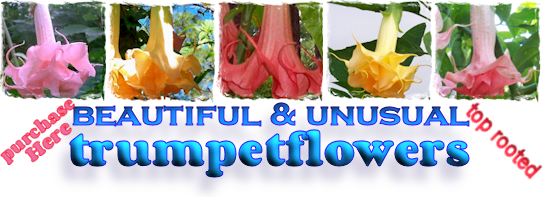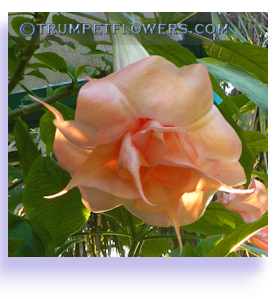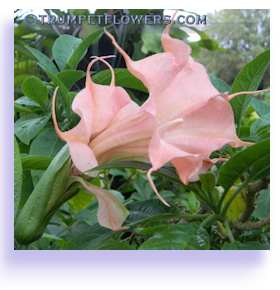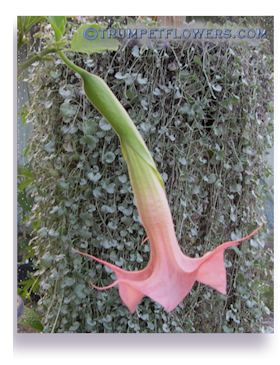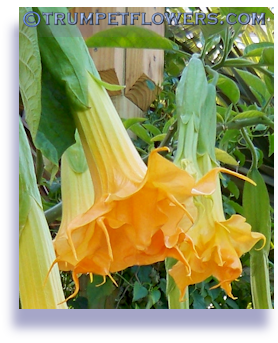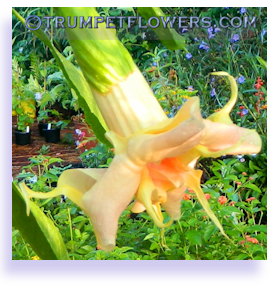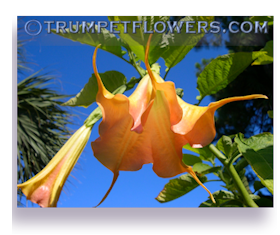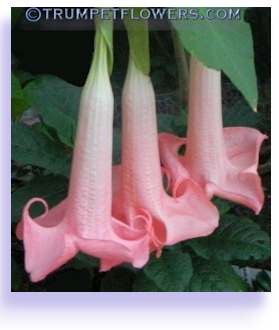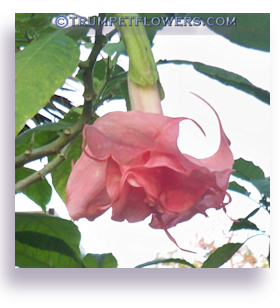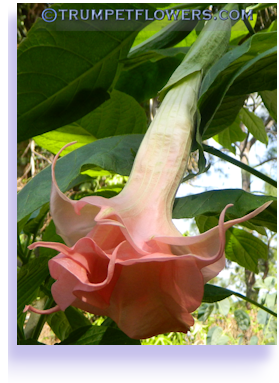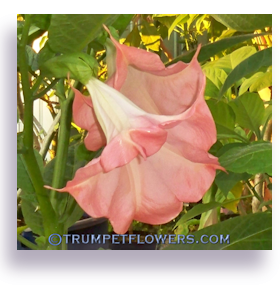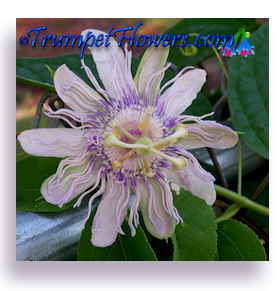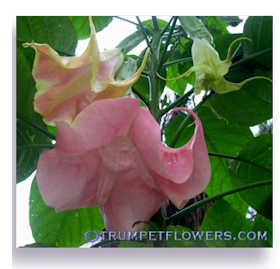Top 50 Questions
about
Trumpet Flowers
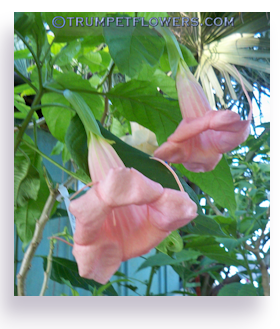 Top 50 Questions used and answered about Trumpet Flowers, or Angel Trumpets, Brugmansia.
Top 50 Questions used and answered about Trumpet Flowers, or Angel Trumpets, Brugmansia.
Question: Trumpet Flowers:
Trumpetflowers are what this website is about. You can learn more about Angel Trumpet, or Brugmansia, by using the Navigation menu bar to your right. There are pages written on all sorts of topics. Here are a few:
- Trumpet Flowers Immediate Care
- Care and Grow Angel Trumpets
- Angel Trumpet Photos
- Angel Trumpet History
Question: Brugmansia Care:
Question: How do I start a new trumpet plants
There are several ways to start out Angel Trumpet plants. If you have cuttings, go to the first and second links below. If you just received a rooted Angel Trumpet, use the third link. Brugmansia are mostly very easy to root, and can take some abuse, but flourish and flush constantly if you show them some love, through lots of fertilizer and water. Rainwater if available.
Question: Trumpet Flowers, Yellow leaves:
Here's more on yellowing leaves on your Angel Trumpets.
Question: How to make brugmansia bloom, or Why my Angel trumpet won't flower:
Getting Your Angel trumpet to bloom includes many factors that could be issue. Here's A lot more on getting brugmansia to bloom:
Question: How do I stop caterpillars eating my brugmansia?
Several types of insect caterpillars (and other pests) could be eating your brugmansia. Here are a few, along with some help:
- Hawk, or Sphinx Moth Larvae and Adults
- Weevil Larvae
- Leaf Beetles (Brugmanisa types eat flowers)
- Skipper moth caterpillars, damage, photos, help
Question: How often can I feed my Brugmansia?
Feeding and Fertilizing your Angel Trumpets is very important. Here are some pointers:
Question: Growing Angel Trumpet in the Ground:
Growing Angel Trumpets in the ground is easy, especially if you are in the right agricultrual zone. Heres some help:
Question: Angel Trumpet Plant Root Base:
The Brugmansia root base is not a taproot type plant. Instead they have many feeder roots that lie just under the surface, and a large root ball of fibrous roots that will spread out underground, as well as go deeper to anchor the plant. Here's a video that will show you one being unearthed from a large, 50 gallon planter:
Question: Will a large cutting of Angel Trumpet bloom the first year?
This is a tricky question, but here is the answer to that:
Question: Is it dangerous to smell an Angel Trumpet Flower?
Sniffing a Brugmansia bloom is wonderful!
Question: Will Angel Trumpet bloom if only One plant?
Yes, Brugmansia cultivars are clones, and reproduce (flowers) on their own. What they won't do if you have only one, is set a seed pod. Here's more on that:
Question: My Angel Trumpet won't bloom. What's wrong?
There could be several things stopping your Angel trumpet from blooming. Let's start here:
Question: Brugmansia Mixed Hybrids
There are thousands of brugmansia cultivars, and almost every one of them are hybrids. There is a lot of information on this in these links:
- Hybrid Brugmansia
- Brugmansia Cultivars Information
- Registered Known Brugmansia Cultivars
- Pollinate Your Angel Trumpets
- Definition of Hybrid
- Definition of Cultivar
Question: How tall do Angel Trumpets Grow?
Angel trumpets, depending upon the cultivar, grow to different heights. I suggest you read through the write-ups on the Gallery pages. There, if I know the heights, I will list them for that cultivar. In general, a brugmansia can grow to over 25 feet if in the ground and kept in frost free zone. Pot bound plants are more manageable, and most brugmansia cultivars prefer large patio pots. The second link will also list some popular cultivars and their heights.
I know of several brugmansia hybridizers that specifically breed some of their plants for shorter heights, to keep them more manageable, and easily brought into the home or garage come winter. Liz Ficthl is one, and has several cultivars she has created that stay beautifully shaped and medium to small sized, such as Dalai Lama and Pirouette
Question: Brugmansia Soil Amendments
Brugmansia are heavy feeders, and love soil amendments. Here is more information on this question:
- Soil Improvements
- Foliar Feed Your Brugmansia
- Brugmansia Foliar Tea
- Alfalfa Tea
- Compost Tea
- Osmocote
- Make Your Own Soilless Mixes (for Brugmansia)
- Epsom Salt
- Alfalfa
- Kelp Powder
- Bunny Doo
- Vermiculture
- How to make Your Own Compost
- Photo Tutorial, Do it Yourself Brugmansia Soil Mix made easy on the back.
I also have a few other exotic plants and seeds for sale as well.
Question: What climate do Angel Trumpets grow best in?
Angel Trumpets in the wild lived in cloud forest elevations, but below the freeze line. Some species grew even lower down the mountains, and therefore can take more heat. There are two groups of Brugmansia, Warm Group and Cold Group. Neither group can take freezing weather, and must be protected from frost. But Cold Group will not grow well at all, and usually die, in climates like Florida and the South West Desert of the USA. These do well in places like San Fracisco, and the upper Pacific North West Coast.
As for Warm Group brugmansia, they can take more heat. These are the cultivars of Angel Trumpets that I grow as you move around this website. But even Warm Group brugmansia don't like excessive heat in most cases, and will bloom best in a mild winter like here in South Florida. So protect your Angels from excessive heat, give them protection from the strongest afternoon sun, and keep them watered well for the best growth and health.
If you'd like to learn more about Cold Group Brugmansia, and see some fantastic photos of them, visit my friend Alan's website in the U.K. He specializes in them, and you can ask him questions about them on his blog: Hurstwood Brugmansia Blogspot
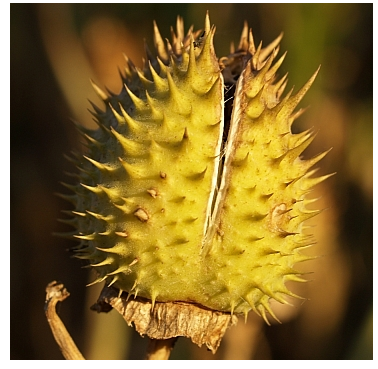 Question: What are the balls with spikes on angel trumpets?
Question: What are the balls with spikes on angel trumpets?
The 'round balls with spikes on them' are seed pods, and are not on Angel Trumpets. You are referring to the seed pods of Devil's trumpet, Datura. Datura are closely related to Angel trumpets, (Brugmansia,) but as a rule Datura is an annual bushy plant, in cooler climates, more weedy (although hybridyzed and some lovely cultivars now exsist) and flowers point upwards, whereas in Brugmansia, the flowers hang downwards from a small to medium sized tree and are for the most part, much larger. Here's a great link to BrugmansiaGrowersInternational's Datura and Seed pods Gallery.
If you want to see the differences between the two, here are Angel trumpet seed pods: Brugmansia Seed pods Gallery.
There are more Angel Trumpet Questions answered here: Brugmansia Q & A
If you'd like to know where to find brugmansia cultivars. email me. My email is on the bottom of each page.

Tags: Top 50 questions about Angel Trumpets, trumpetflowers, top 50 questions asked about angel trumpets, answers, brugmansia, angel trumpet,, More Q and A about Brugmansia
This entry was posted on September 10, 2013, 2013 and is filed under Information